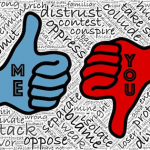
Galen Broaddus (atheist blogger at Across Rivers Wide): A lot of conversations lately among my friends of various religious (or non-religious) persuasions have me thinking about how we deal with the criticisms not from outside our own communities or traditions but from within them. For instance, my friends in the UMC are struggling with the church’s ruling that their openly gay, married bishop is in violation of church law and how to move forward. I think that’s a position that most of us have probably found ourselves in, one way or another.
Andy Gill (progressive Christian blogger at Andy Gill): The questions I have that come to mind are many: Do the two of you feel or believe there’s something wrong with internal critiques going public? Why or why not? Is there ever a time that it’s okay? And we’ll stick on internal going public; but I recognize the going public aspect of this brings on external critiques also; thoughts on those?
Galen: I think that I mostly get why people dislike having “dirty laundry” aired — people treat those internal fights as evidence of a community or worldview’s toxicity and corruption. But I think trying to keep them internal presents its own problems. Transparency is useful. (Besides, dishonest critics from outside are going to be dishonest no matter what.)
Hind Makki (Muslim blogger at Hindtrospectives): “Dishonest critics from outside are going to be dishonest no matter what.” I think you hit the nail on the head, Galen. People are often worried that if internal critiques go public, then there will be more fodder for the haters. But the haters will always hate, so that should not be an excuse to not discuss real problems within the community with the aim of challenging or dismantling systems of oppression.
Andy: How then do we decide or come to correctly pin the “haters”? Because I think many times we can [mis]label haters, when in all actuality they’re innocent (and maybe ignorant) bystanders trying to learn or help, or who (due to their ignorance) need to be taught.
Hind: Well, at least for American Muslims, the Islamophobia cottage industry is well-known, organized, and long-established. I’m not going to take someone tweeting about FGM/C seriously, if they are also on the Southern Poverty Law Center’s list of figures fomenting hate against Muslims. There are certainly some people who might be well-meaning, but culturally insensitive, in their activism against FGM/C, but those people aren’t found on the SPLC website.
Galen: Yeah, I think sometimes the haters are obvious. Last year, I wrote up a piece expressing anger about things happening in the atheist community, and I ended up getting quoted by Conservapedia and got my own entry in that wiki. They weren’t interested in fair critique.
The edge cases are harder, granted.
Hind: I also think that it’s practically impossible – in the age of social media activism and our snap communication culture – to keep “controversial” conversations private.
Andy: I’ve got to remember in this conversation especially that we’re coming 3 very different perspectives. It seems and feels (I could be very embarrassingly wrong on this) that my stance on this topic is affected by my experience in Evangelical circles and seeing their tactics; for instance, they shun “outside” critiques far too often. Yes, there are legitimate times and circumstances “this or that” should not have gone public, but far too often they also will hide, cover up or attempt to silence others by keeping things far too private. It’s the difference of brushing dirt underneath the rug vs. fairly discussing topics internally to try and truly bring out fairness and equality.
So, as an evangelical, I welcome critiques from the outside, and I’ve loved seeing the effects (mostly positive IMO) of these “internal debates” getting reallllllly f*ckin’ public.
#MarsHill
Galen: At the risk of sounding like an external critique, I agree with you here. Christianity does have some teachings (primarily in the Pauline epistles) that could tend toward wagon-circling. I think that’s a bad idea for all involved.
Hind: I love that we three are coming at our discussions from very different perspectives; it’s what the blog is about. 😉
What do you mean, Andy, by “shun outside critiques?” Ignoring them? Plenty of Muslims do a good job ignoring outside critiques, and sometimes it’s form of self-preservation, while other times it’s a form of sticking their heads in the sand on a real problem (like the sexual abuse case at a Chicago Quran school a few years ago).
Galen: I think Christianity has (in general) much less claim to self-preservation. In my experience, the groups within Christianity most likely to need that (often, LGBT-affirming Christians) are the ones pushing for internal dialogue. The ones who don’t want it are the ones who think the status quo must be defended at all costs. That’s mostly what I’ve seen (and experienced when I was a Christian expressing dissatisfaction about Christian culture) from Christianity.
And to be honest, that’s true of atheist and skeptic communities. There’s an established order, which tends to be white and male (of course), and pushes for diversity or social justice get met with resistance from certain corners.
Andy: Well, an example, I think is particularly happening far too often in that any POC that rejects a Eurocentric Gospel is almost immediately anathematized from Evangelicalism.
If I so far as suggest a question that might challenge their white doctrine, I’m excoriated and dragged away from the table I refuse to leave; nowadays we just built our own table (thankfully) and it seems like soon enough they’ll be asking for a seat.
Hind: Are they upset by their doctrine being challenged because they think multi-culturalism is a secular invention and they don’t want any secular influences? Or because of good ole white supremacy?
Galen: Yes.
Andy: I don’t want to bring the conversation south, but Hind, critiques of the #BlackLivesMatter movement… when are they okay from the outside?
Hind: From my experience, I expect that outside critiques will come in whenever a minority group leads the charge on social action. It’s not even really a matter of whether the outside critiques are OK or not — they are just a reality. My philosophy is that people can talk smack all they want, but I maintain the right to not have to engage them if I don’t want to. Life is literally too short. This isn’t to say that critiques are unimportant. I think they are vital to the growth and effectiveness of any social movement or faith group. And when offered in good faith (heh), even from the outside, from a neutral or even antagonistic observer, they can be very healthy indeed.
Andy: Yes, I just feel that being a “POC” within evangelical circles and families is frustrating in that many of the younger fellow evangelical comrades of mine, we have a tough time recognizing what you said: “they are vital to the growth and effectiveness of any social movement or faith group.”
And I think that many of the evangelicals at our table have a fear in engaging this conversation… When yes, I think the fear of hurting/harming is real and necessary, but their wisdom and words are needed, too. (You gotta know it’s taken me, personally, years to get to this point in acknowledging what you said, Hind, regarding their words [that are healthy] being vital.)
While some of them utilize this silence and lack of critique/comment to selfishly not engage.
Hind: I hear you. I don’t know what to say other than that America’s “first sin” was white supremacy and we are still dealing with the effects. There were noble efforts by some Christians to challenge that in limited ways (thinking about abolition, for example), but self-critique is hard. Which is why, I think, people put up barriers even within a group and push those who are agitating for change outside the group by virtue of their critiques. I can’t speak to your experience, but I’ve definitely seen that. “If you don’t like it here (in this mosque, in this community, in this country), then leave!” Why should I leave here, when I am part of “here,” too?
Galen: I see that tendency to disengage with atheist groups. I admit that I’ve been somewhat guilty of it myself.
Hind: Yeah, I’ve disengaged with the mosques near me because I’m tired of putting up with a lot of “isms,” but I refuse to disengage with the faith community.
Galen: That feels like the self-preservation that I see: people detaching themselves from individual communities (and sometimes the larger ones) because they can’t tolerate the racism, sexism, homophobia, etc. of the group. I can’t say that I blame anyone for that.
Hind: Exactly, it can be very toxic and debilitating to be in that kind of space, especially if you joined that space, in the first place, to become more mindful of the Big Picture.
Going back to Galen’s point about some communities worried about their dirty laundry getting aired, I always say: Let’s do our laundry and we won’t have to worry about it getting aired. 😉
Galen: Can’t argue with that.
Image via Pixabay













